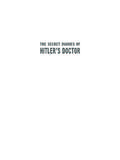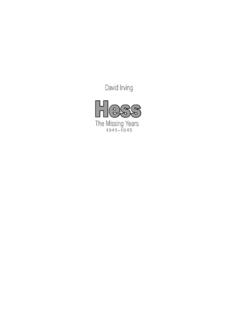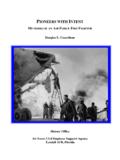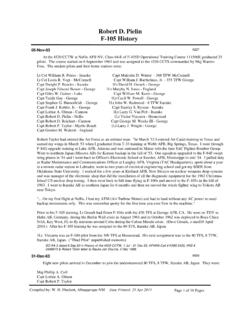Transcription of Banged uP - David Irving
1 Banged uP. Banged up 3. David Irving Survival as a Political Prisoner in 21st Century Europe A British historian spends four hundred days in solitary confinement in Austria's oldest jailhouse, convicted under a 5 Stalin-era law because of a lecture on history that he has delivered in Vienna sixteen years before. There is outcry in the free world's press. Soon he is faced with new charges, carrying a twenty-year sentence, for talking to the BBC. Then the case comes to the Court of Banged up Copyright ( ) 2008. Parforce UK Ltd All rights reserved. No part of this publication may be commercially reproduced, copied, or transmitted, save with written permission of the author in accordance with the provisions of the Copyright Act 1956 (as amended). Any person who does any unauthorised act in relation to this publication may be liable to criminal prosecution and to civil claims for damages.
2 Banged Up is an extract from the memoirs of the author. It is also published in Poland, Greece, Austria, Germany, and other countries around the world. In German it has the title meine gef ngnisse: Erlebnisse und Gedanken in sterreichischen Kerkern 160 pages with many photos and documents, euros (or 20 euro including p. & p.) The German title is an allusion to the classical Italian work Le mie prigioni by Silvio Pellico about his imprisonment by the Austrians starting with Milan, which was then an Austrian city, in 1820. The book is available as a free download in PDF format from our website at Focal Point Publications Windsor, Ssl4 6qs, England British Library Cataloguing-in-Publication Data A catalogue record for this book is available from the British Library isbn 978 1 872 19731 9.. i n de x Prologue: The War We Infants Had 1. Political Prisoner in Austria 2005 2006: Eight Men with Glocks 9.
3 By Krokodil to Vienna 19. The Trademark Pen 38. The Year that Never Was 53. I Change Lawyers and We Counter-attack 65. On Remand 72. Lifetime Achievement Award 88. They're Out for Blood 107. Epilogue The Ring 134. Banged up Park House in Hutton, in World War Two our happy home in the Essex coun- tryside where I spent my first eighteen years, surrounded by family pets.. prologue The War We Infants Had JUST as babies have no developed fear of snakes or spiders, I don't think we children were ever old enough to be mortally afraid of war. We were more curious about, than frightened by, Adolf Hitler's Blitz. In about 1940, when I was two, a Heinkel bomber crashed in the Blue- bell Woods, and we sometimes picnicked near the wreckage. My older brother John picked over the remains and found a flying boot containing the pilot's toes. He brought it home with visions of boundless popularity at school arising from this gruesome find; our mother had no such vision, and tossed the boot irritably away (so he tells me now).
4 I do recall that he swore to me at the time that the Heinkel had been piloted by a Red In- dian and a cowboy, and I saw no reason to disbelieve that throughout the war. Exploring those same woods later in the war, or perhaps after, my friends and I came across a bomb dump, a shallow pit filled with frag- ments of bombs, though whether they were British or enemy I don't know.. Banged up Later, the fields around our houses were decorated with garlands of tinsel foil, painted matte black; that must have been after the RAF started dropping Window metal anti-radar foils on Germany in the sum- mer of 1943, and the Luftwaffe lifted its own foolish embargo on using this secret device. No boy of five or six was accepted by his pals unless he knew and could identify all the Jerry bombers and fighter planes just by the sound of their engines. Playing with the urchins from Hutton Village, we briefly stopped at the sound of airplanes duelling high over our heads; we could not see them, but we knew all about them, those Heinkels and Junkers and Dorn- iers, just as children now have their favourite sneakers or pop stars.
5 The Heinkel 111 was the workhorse of Hermann G ring's bomber fleet, it carried the Luftwaffe's heaviest load; it droned stealthily up the Thames estuary and headed northwest into Essex the ball-bearing works of the Hoffmann Manufacturing Company was at Chelmsford. Its twin Daimler-Benz 601 engines ran slightly out of sync; the engine note rose and fell. Where are you? Where are you? Where are you? it crooned, or so it seemed to the ear of Graham Greene's little murderer on the run.. On mornings in 1944 and 1945 we stood on our ragged tennis lawn shading our eyes and peering up at the awesome spectacle of the Flying Fortresses of the Eighth Air Force glittering high overhead, flying in perfect box formation as they circled over East Anglia to gain height and set course for Germany. Later we would see the same squadrons return, with some planes missing from the box but the rest still holding tight formation.
6 Death meant nothing to us children. I had a soft-plastic black model of a Stirling bomber a Lancaster would have been worth more. We bought and bartered such things by swapping them for marbles or prize conkers. For my American and other readers unfamiliar with the English autumn schoolyard conkers are highly polished horse-chestnuts pierced with a short length of string, and used in one-on-one combat: one boy dangles his conker, the opponent's object is to smash it with one swing of his. Of course we experimented with various performance-enhancing chemicals like vinegar, rumoured Ministry of Fear (London, 1941). The War We Infants Had . to harden the nut to invincibility. The other, less belligerent, schoolyard game was marbles, played with dime- or quarter-sized coloured glass balls. Recollections of the war are few but vivid: I saw a V-1 doodlebug, a flying bomb, a buzz bomb it was called all these things growling one night swiftly across my field of vision, from left to right, as I stood on tiptoes and looked out of our bathroom window one evening in 1944; it must have been about a mile away and running quite low.
7 The V-1s impacted all over the Essex countryside; one came down . near Mountnessing, another half a mile away from us. On the way up to church that Sunday we visited the crater near the Hutton village school: around the rim lay scattered the tangled wires and metal of this contrap- tion. As distant detonations rattled the house and windows, cracks ap- peared in the ceiling. It was of course nothing compared with what life in the cities must have been like; in retrospect, it is hard to imagine the anguish that a mother of four children, separated from her husband who is away at sea, must have felt every time she heard the planes or V-1s go- ing over. We children certainly had no fears. We slept at night in the rusty steel Morrison shelter a solid table of sheet steel and angle-iron which had been painted with a kind of pink distemper and covered with a tablecloth to serve as a table by day.
8 If the house had collapsed, we would have been safe inside. from all around the silent horizon, that summer of 1944, day and night, there emerged this deep penetrating tone, a kind of animal growl on one single frequency, and we infants huddled in the Morrison shelter and waited out the five minutes of suspense which that rumbling sound pushed ahead of it. We six-year olds knew the ritual by now. Out here in the country we heard every sound that these weapons, the V-1s, made. No sirens sounded. Their own organ note heralded their approach. We hadn't been frightened by the stories of butterfly-bombs;. we had rather liked the Christmas festoons of long silver paper strips that the planes dropped over our hedges and fields; but the V-1 was different and evil. Banged up After a minute or so, as the speeding weapon came into sight too fast for any but the new Meteor jets to catch, and those we never saw the full roar of its engine came, vibrating through the trees and across the cornfields, louder and deeper than the deepest double-diapason note of which our village church organ was capable.
9 The V-1's Argus Tube, a simple pulse-jet engine, was built in the un- derground Mittelwerk plant near Nordhausen, captured by US forces in 1945. If you caught sight of the evil thing, it was scudding at low altitude across the sky in a straight line, a stab of flame streaking behind its en- gine. Usually the robot just carried on in a straight line it had no pilot to be daunted by ground fire; but there were times when the weapon's heart-throb suddenly cut out. Six-year-olds don't fear death. I'll say it again; but our mother and every adult around us must have prayed to the Lord each time that en- gine note cut out. Every one of us knew that you counted twenty-five as the missile hurtled down in its silent death-glide to the ground. Then it detonated with a sudden white flash against which all the trees and animals and houses on the horizon were silhouetted in black, even in daytime.
10 It was an illusion of some kind, but I always thought I heard a shower of glass follow the bang. It was that, being sliced by the broken glass, that the younger women most feared. (Government studies showed this: I wrote about it all, twenty years later, compiling the biography of the German field marshal who had sent these weapons over to us. Their one ton warhead carried an aluminized explosive that packed twice the punch of tnt.). Other than the low jungle growl of the distant pilotless V-1s, no sound recalls for me the years of World War Two as does the English air raid siren. It had its own accent. I've heard sirens since then from Illinois (tor- nado warning) to Austria (prison breakout) and they leave me unmoved;. but the ghostly lament of the 1940s English siren, actually two tones work- ing in incongruous tin-whistle harmony, is hard-wired into our genera- tion's memories.





